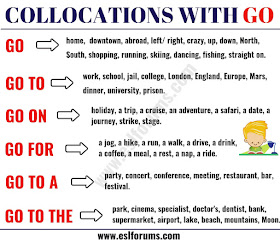A basic chart of how affirmative, negative & questions structures work in English for the Present, Past and Future.
Pages
▼
Tuesday, 31 May 2016
Monday, 30 May 2016
COLLOCATIONS WITH "GO"
Today's post shows different collocations with the verb "GO" and its combinations with different words. Do you understand them all? Some of these collocations are synonyms, do you know which? Some more examples with "GO", can be found HERE.
Sunday, 29 May 2016
Saturday, 28 May 2016
SAY MY NAME
Say My Name is a band from A Coruña featuring former students from our school: Andrea de Artaza, the lead singer, and Dani Vaamonde, together with Valeria Rubal, Jorge Salgado and Tomás Loroño. Last night they premiered the songs from their first record in Betanzos. Soon they'll be playing in Santiago and on July 22nd at El Pelícano in A Coruña.
Video "I'M IN LOVE", Say My Name:
Friday, 27 May 2016
RAFAEL DIESTE'S 2016 GRADUATION CEREMONY.
This evening, once again, like every last Friday in May, we said goodbye to this year's 2nd BAC students, who leave our school on the road to their new future...
Again students, families and teachers gathered at the Assembly Hall of the nearby Profesional Music Conservatory of A Coruña to celebrate their farewell from the secondary school years.
A very smart ceremony hosted by Jose Juan, with speeches by our headmaster and Clara Manrique, on behalf of the students, and musical performances by some of them...
One of the great moments was when J. compared our school with Spain. Rephrasing his speech, it was something like this:
"Our school works much better than our country. We don't have problems with our royalty, we have our own Isabel & Fernando. Every four years, we choose our headmaster without any trouble or complication... one goes out, another comes in... And we don't make such a fuss about parents bringing their own kids to work like with Carolina Bescansa. Ramón Neira has always brought his children to work since the first day he started working here without any objections."
A very smart ceremony hosted by Jose Juan, with speeches by our headmaster and Clara Manrique, on behalf of the students, and musical performances by some of them...
One of the great moments was when J. compared our school with Spain. Rephrasing his speech, it was something like this:
"Our school works much better than our country. We don't have problems with our royalty, we have our own Isabel & Fernando. Every four years, we choose our headmaster without any trouble or complication... one goes out, another comes in... And we don't make such a fuss about parents bringing their own kids to work like with Carolina Bescansa. Ramón Neira has always brought his children to work since the first day he started working here without any objections."
As usual, we wish all the best in your future and remember your years with us!
Galician version of this post @ ArquivosDoTrasno.
Galician version of this post @ ArquivosDoTrasno.
Wednesday, 25 May 2016
Tuesday, 24 May 2016
Monday, 23 May 2016
Sunday, 22 May 2016
WORDS WHERE 'CH' SPELLING IS PRONOUNCED /k/ or 'sh'
A pronounciation lesson today. Words with spelling 'CH', which are pronounced either /k/ as the words above or 'sh' as the ones below.
Saturday, 21 May 2016
Friday, 20 May 2016
Thursday, 19 May 2016
OTHER WAYS OF SAYING "SAY"...
Here are different ways of expression "SAY". They can all be used as introductory verbs in the reported speech.
Wednesday, 18 May 2016
Monday, 16 May 2016
COLLOCATIONS WITH "CATCH"
You can find more collocations with "CATCH" on a previous post HERE.
Som examples in context:
- He caught the ball before it went onto the road.
- The weather was so bad during the weekend that I caught a cold/chill/flu,
- Don't worry, I'll catch the bus to your house.
- The police caught the thief as soon as he left the bank.
Som examples in context:
- He caught the ball before it went onto the road.
- The weather was so bad during the weekend that I caught a cold/chill/flu,
- Don't worry, I'll catch the bus to your house.
- The police caught the thief as soon as he left the bank.
Saturday, 14 May 2016
Friday, 13 May 2016
WHAT ARE YOU GOING TO DO THIS WEEKEND?
Expressing arrange plans for the near future with BE GOING TO+infinitive.
What are you going to do this weekend?


















































